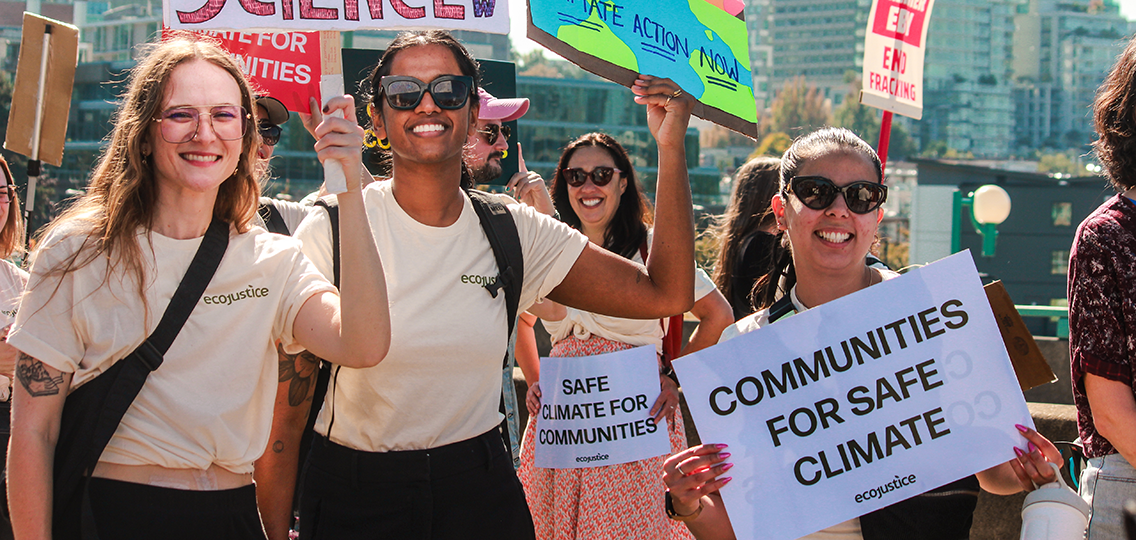People across Canada show they want climate action. Now, it is time for governments to act.
This summer, Canada experienced its worst wildfire season on record. More than 40 million acres burnt during the summer months. Fire forced thousands to evacuate, people lost their homes, and smoke blanketed our cities and towns.
The climate crisis is real, and we are in an emergency. Every level of government and businesses across Canada should be acting. But we still witness so much delay, inaction, and downplaying of this crisis by those in positions of power.
At the same time, communities across Canada, Indigenous peoples, and young people are demanding action.
Communities for a safe climate
There is still cause for hope and optimism. Millions marched across Canada — and worldwide — to demand action this September. [1]
Coinciding with the UN climate summit in New York, marchers called for a rapid, just, and equitable end to fossil fuels.
These public protests, often led by young people, showed that the people want action. Ecojustice offices across Canada joined our local marches in solidarity.
But it is not only on the streets that young people are taking action. They are also heading to courtrooms to make sure governments are taking the climate crisis seriously.
Ecojustice is proud to represent seven young Ontarians in Mathur et al. These youth are holding the Ontario government to account for rolling back climate ambition.
This month, they announced that they will be heading to court in January 2024. On January 15 and 16, they will go to Ontario’s appeal court to continue fighting for youth and future generations.
Leaders must take action!
Young people shouldn’t be forced to act — the responsibility lies with those in power.
In July, the UN secretary-general, António Guterres, spoke unequivocally about the climate crisis. He warned that the era of global warming had ended and that the era of “global boiling” had arrived. [2]
He said, “the air is unbreathable, the heat is unbearable, and the level of fossil fuel profits and climate inaction is unacceptable. Leaders must lead.”
Political leaders in Canada must pay heed to this warning.
In a few short weeks, Canada will attend COP28 in Dubai. Countries from around the world will assess if global temperature rise can be kept below 1.5 degrees Celsius.
At this global conference, Canada’s climate policies will be under the spotlight. There are steps that Canadian political leaders must take to ensure Canada is achieving the goals of the Paris Agreement.
A strong oil and gas emissions cap
The federal government is currently working on regulations that will cap emissions from the oil and gas industry – Canada’s most polluting sector, which is responsible for over a quarter of its annual carbon emissions. These regulations are crucial if Canada hopes to achieve its climate targets.
Canada makes all the right promises. It has domestic emissions targets set out in legislation and also signed on to the Paris Agreement to limit global warming to 1.5 degrees Celsius.
But Canada has failed to meet any of the emissions targets it set in the past and is not yet on track to meet its 2030 target. The federal cap on oil and gas emissions is an opportunity to change this trajectory. As the world seeks to shift away from fossil fuels, now is the time to force the oil and gas sector to take responsibility for cutting its emissions.
No more fossil fuel projects
The International Energy Agency — the world’s foremost authority on energy policy — has stated to achieve the goal of 1.5 degrees Celsius, there can be no new fossil fuel projects. This can be done while meeting global energy needs. [3]
At the same time, Canada continues to grant approvals for new oil and gas projects.
Bay du Nord is a $16-billion oil and gas megaproject proposed off the coast of Newfoundland and Labrador. The federal government approved the project in April 2022.
Over its lifetime, Bay du Nord is expected to produce up to one billion barrels of oil, which in turn will generate about 400 million tonnes of greenhouse gas emissions.
This month, Ecojustice announced that we are continuing to fight the approval of Bay du Nord through the courts.
In B.C., the provincial government is debating whether to approve the Tilbury Marine Jetty project in Delta. This project will allow B.C. to ship fracked gas from the north of the province to markets in Asia. This will increase greenhouse gas emissions and put even more pressure on B.C.’s precious marine life.
This project would be in addition to the LNG Canada, Cedar LNG and Woodfibre LNG projects that have already been approved. These projects process and export fracked gas from Northern B.C.
Fracking produces significant greenhouse gas emissions, particularly methane, at every stage, from the drill site to LNG production to transportation in ships and pipelines. Methane is 80 times more powerful as a greenhouse gas than CO2.
All levels of government must reject any new fossil fuel projects if we hope to contain the climate crisis.
Stop funding climate chaos
Canada’s financial institutions are among the largest funders of oil, gas, and coal in the world. Big finance is using your money to fund a climate crisis.
At the same time, these financial institutions claim to be aligned with the goals of the Paris Agreement. Funding fossil fuels while claiming to be climate-conscious is greenwashing.
RBC is the top commercial bank providing the Coastal GasLink pipeline with working capital while acting as a financial advisor for the pipeline. This pipeline will bring fracked gas through northern B.C. and is currently violating Indigenous rights and sovereignty in Wet’suwet’en territory.
Canadian financial institutions must develop credible plans to contribute to Canada’s climate goals.
The federal government must cut through the greenwash by introducing new regulations that force banks, pension funds, and insurance firms to make credible climate plans.
End exports of thermal coal
Thermal coal is the world’s dirtiest fossil fuel – a 19th-century product that has no place in the modern world.
Thermal coal is being phased out as a source of energy in Canada. But it continues to export millions of tonnes of thermal coal each year, including American coal, for sale in other countries.
Canada’s continued role as an exporter of U.S. and Canadian thermal coal undermines this country’s ability to become a climate leader and build a brighter future.
The federal government has committed to ban thermal coal exports by 2030. But the world is on fire now, and it must introduce this ban as soon as possible.
Where do we go from here?
The wildfires that have ripped through Canada this past summer touched almost everyone. Whether the fires forced you to flee from your home, or whether you breathed polluted air, we all know this isn’t normal.
Ecojustice is committed to fighting the climate crisis. We will continue to hold those with power to account to make sure they will do everything they can to build a sustainable future.
References
[1] Climate protesters around the world are calling for an end to fossil fuels as Earth heats up — CTV
[2] ‘Era of global boiling has arrived,’ says UN chief as July set to be hottest month on record — The Guardian
[3] World Energy Outlook 2022 — International Energy Agency


